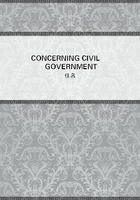
第30章
119. Every man being, as has been showed, naturally free, and nothing being able to put him into subjection to any earthly power, but only his own consent, it is to be considered what shall be understood to be a sufficient declaration of a man's consent to make him subject to the laws of any government. There is a common distinction of an express and a tacit consent, which will concern our present case. Nobody doubts but an express consent of any man, entering into any society, makes him a perfect member of that society, a subject of that government. The difficulty is, what ought to be looked upon as a tacit consent, and how far it binds- i.e., how far any one shall be looked on to have consented, and thereby submitted to any government, where he has made no expressions of it at all. And to this I say, that every man that hath any possession or enjoyment of any part of the dominions of any government doth hereby give his tacit consent, and is as far forth obliged to obedience to the laws of that government, during such enjoyment, as any one under it, whether this his possession be of land to him and his heirs for ever, or a lodging only for a week; or whether it be barely travelling freely on the highway; and, in effect, it reaches as far as the very being of any one within the territories of that government.
120. To understand this the better, it is fit to consider that every man when he at first incorporates himself into any commonwealth, he, by his uniting himself thereunto, annexes also, and submits to the community those possessions which he has, or shall acquire, that do not already belong to any other government. For it would be a direct contradiction for any one to enter into society with others for the securing and regulating of property, and yet to suppose his land, whose property is to be regulated by the laws of the society, should be exempt from the jurisdiction of that government to which he himself, and the property of the land, is a subject. By the same act, therefore, whereby any one unites his person, which was before free, to any commonwealth, by the same he unites his possessions, which were before free, to it also; and they become, both of them, person and possession, subject to the government and dominion of that commonwealth as long as it hath a being. Whoever therefore, from thenceforth, by inheritance, purchases permission, or otherwise enjoys any part of the land so annexed to, and under the government of that commonweal, must take it with the condition it is under- that is, of submitting to the government of the commonwealth, under whose jurisdiction it is, as far forth as any subject of it.
121. But since the government has a direct jurisdiction only over the land and reaches the possessor of it (before he has actually incorporated himself in the society) only as he dwells upon and enjoys that, the obligation any one is under by virtue of such enjoyment to submit to the government begins and ends with the enjoyment; so that whenever the owner, who has given nothing but such a tacit consent to the government will, by donation, sale or otherwise, quit the said possession, he is at liberty to go and incorporate himself into any other commonwealth, or agree with others to begin a new one in vacuis locis, in any part of the world they can find free and unpossessed; whereas he that has once, by actual agreement and any express declaration, given his consent to be of any commonweal, is perpetually and indispensably obliged to be, and remain unalterably a subject to it, and can never be again in the liberty of the state of Nature, unless by any calamity the government he was under comes to be dissolved.
122. But submitting to the laws of any country, living quietly and enjoying privileges and protection under them, makes not a man a member of that society; it is only a local protection and homage due to and from all those who, not being in a state of war, come within the territories belonging to any government, to all parts whereof the force of its law extends. But this no more makes a man a member of that society, a perpetual subject of that commonwealth, than it would make a man a subject to another in whose family he found it convenient to abide for some time, though, whilst he continued in it, he were obliged to comply with the laws and submit to the government he found there. And thus we see that foreigners, by living all their lives under another government, and enjoying the privileges and protection of it, though they are bound, even in conscience, to submit to its administration as far forth as any denizen, yet do not thereby come to be subjects or members of that commonwealth. Nothing can make any man so but his actually entering into it by positive engagement and express promise and compact. This is that which, I think, concerning the beginning of political societies, and that consent which makes any one a member of any commonwealth.